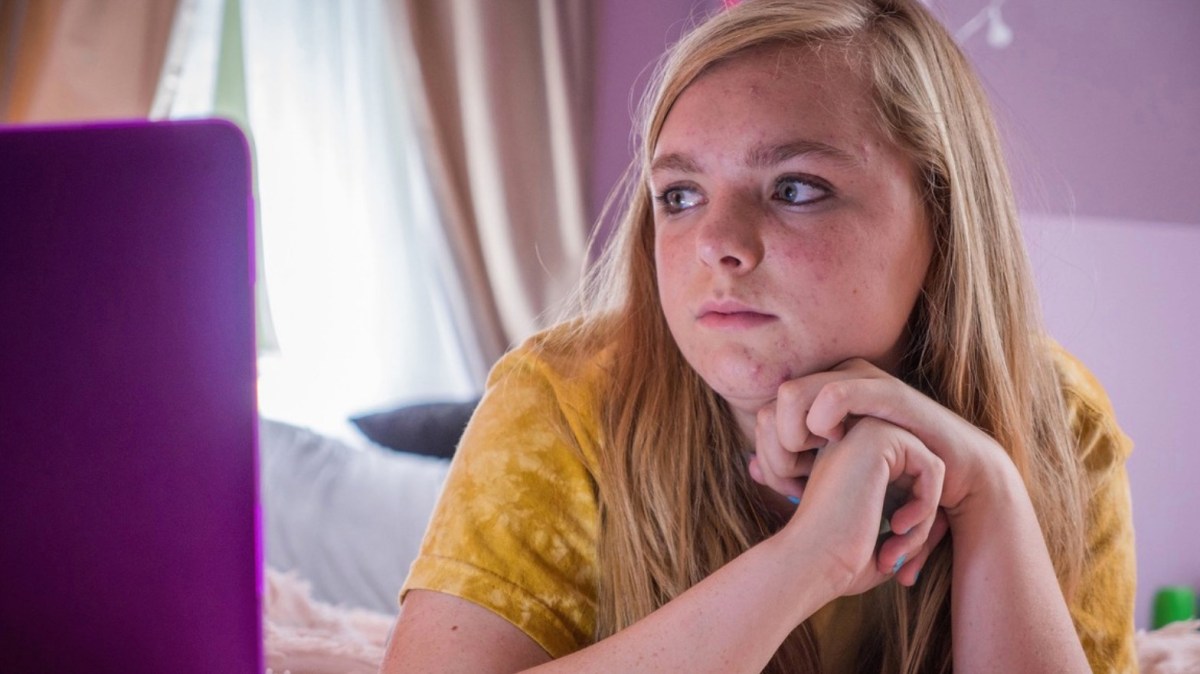Today, the Golden Globes nominations were announced, and of course there were snubs. There will be plenty written about the films and creatives who didn’t make the final cut, so I’d like to take this most rainy Thursday to talk about Eighth Grade and why it deserved a Director and Screenplay nod alongside the nomination for Best Actress it did receive. This is not to say that Elsie Fisher’s nomination isn’t wonderful; she was the beating heart of the film and absolutely deserves all the acclaim.
But writer-director Bo Burnham deserves praise as well. Burnham rose to fame as a comedian, and says he drew inspiration from his own struggles with anxiety. It’s a personal film; Burnham told The Hollywood Reporter: “If you want to be stuck in your own head worrying about your image and how the world perceives you, you either have to be a 25-year-old male comedian or any 13-year-old girl, you know?”
The story is one of those stories in which very little happens. Kayla (Fisher) is about to graduate eighth grade and move onto high school. Her father (Josh Hamilton) is struggling to connect with her. Kayla endures a pool party, a visit to high school, and their mini graduation. She alternates between shyness with her peers and frustration, even anger, with her father. Every situation seems world-ending, because at that age, every situation is. Nothing is low stakes when you’re thirteen years old.
Throughout the film, Burnham captures an authenticity that is often absent from films about teenagers. Maybe it’s the fact he’s been performing for younger audiences for years. Maybe it’s the research he did watching youthful vlogs on YouTube. Regardless of how he got to this point, he writes with an empathy that is jaw-dropping. This isn’t a male perspective on teenage girlhood, it’s a nuanced portrayal of growing up that happens to center on the particular trials of being a teenage girl.
One scene that particularly stands out for the delicate way it handles the use of screens. Kayla is glued to her phone, scrolling through Tumblr, Twitter, and Instagram. The scene isn’t presented as being some sort of terrible moment, or an addiction that Kayla needs to break. It’s just a normal part of adolescence in the modern era. There’s something fairly timeless about the scroll, illuminated by the glow of the screen; who among us hasn’t laid in bed and scrolled for hours when we should have been sleeping?
Burnham could have turned that into a soapbox-y, moralizing take on screentime, but Burnham doesn’t judge Kayla. He recognizes what life is like and embraces how Kayla uses the Internet to socialize and to connect. Do we ache for her to have the same connections offline? Yes, but we also cannot judge her for her online persona too. She’s trying to connect in an age where the digital means almost as the personal.
Another way Burnham handles his story empathetically is by handling sex in a nuanced way. Kayla, at one point, tries to learn how to give a blowjob via videos on YouTube to impress a boy she likes. She steals a banana from the kitchen and almost practices on it before her dad walks into the kitchen. The scene isn’t supposed to be sexy, or even humorous in the same way Big Mouth tackles puberty. It’s just awkward, and weird, which is how most adolescents feel when it comes to sex.
More importantly, when Kayla is faced with pressure from a high school boy to take her shirt off and experiment with him. The scene is skin-crawlingly horrifying as Kayla sits in the backseat of the car. The audience at the screening I attended was viscerally upset as the scene ramped up in intensity, with the boy shaming Kayla for not wanting to go farther with him. Burnham doesn’t frame this as being normal, or the boy as being anything other than a terrible creep. His sympathy is for Kayla.
Eighth Grade is not a #MeToo movie, whatever that means. It presents a harsh reality about young girls growing up. Burnham avoids making the film seem exploitative by handling these scenes with grace and empathy for his heroine, rather than trying to hammer home a point. He is not trying to make the audience believe a moral, he is just trying to illustrate what it is like to grow up in this particular day and age.
Fisher’s performance soars, but Burnham deserves some recognition for his intensely personal and empathetic work on the film. It’s a crowded year for Best Director, but if Burnham scores a Best Original Screenplay nod, you’ll find me cheering on social media. Work that is this delicate deserves praise, and I hope Burnham takes home at least one award this season for his work.
(image: A24)
Want more stories like this? Become a subscriber and support the site!
—The Mary Sue has a strict comment policy that forbids, but is not limited to, personal insults toward anyone, hate speech, and trolling.—









Published: Dec 6, 2018 01:16 pm